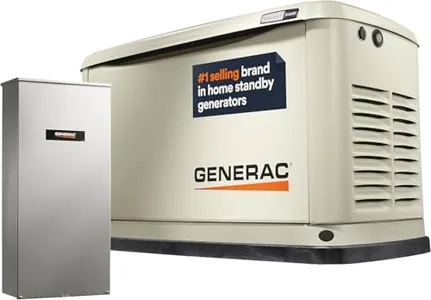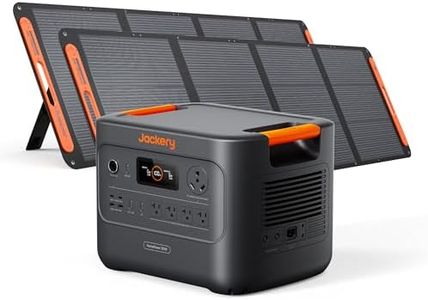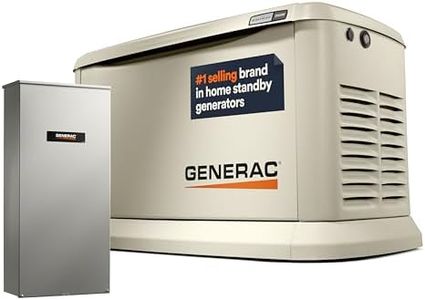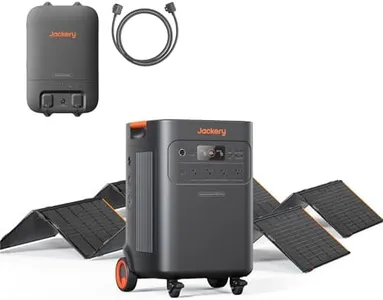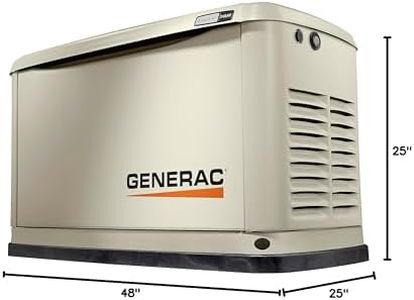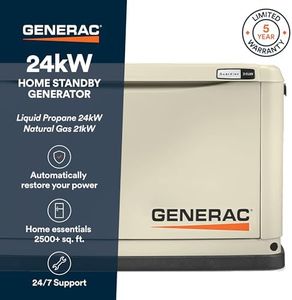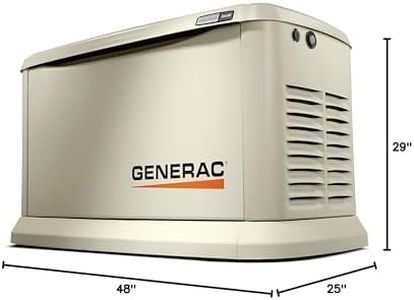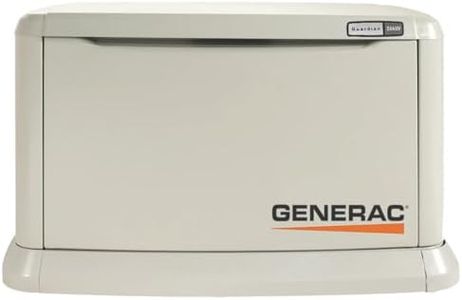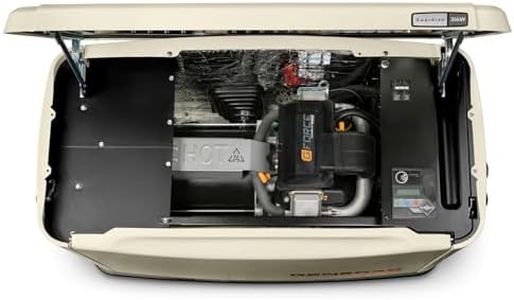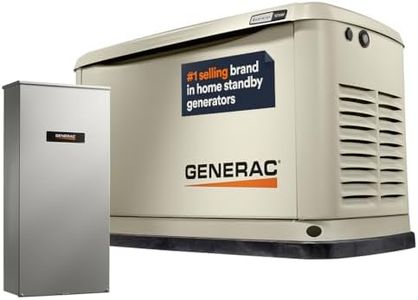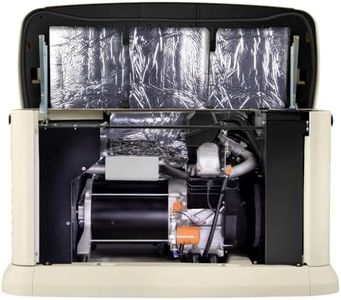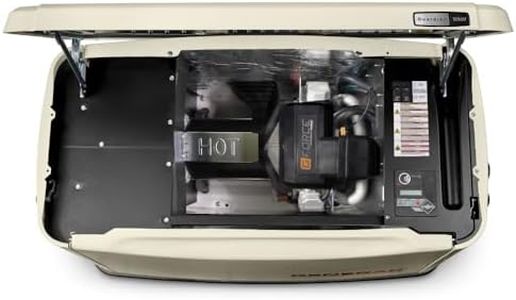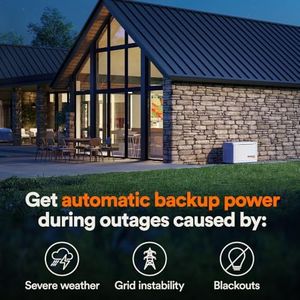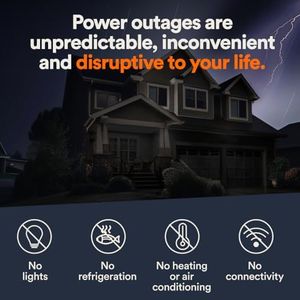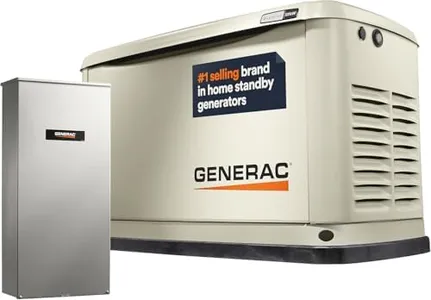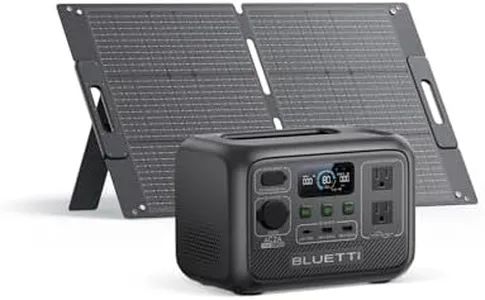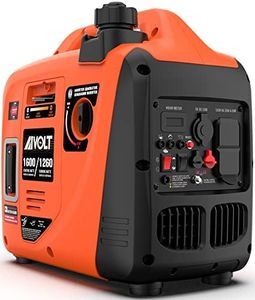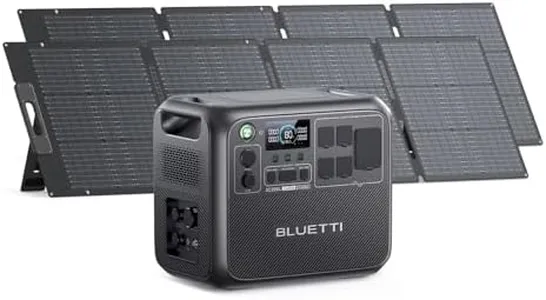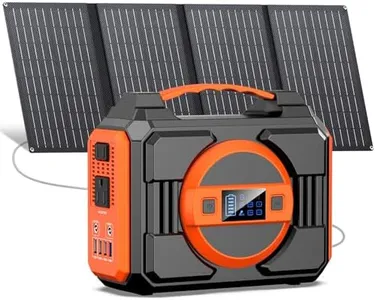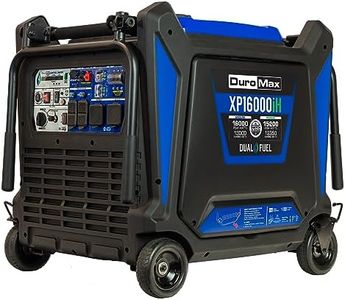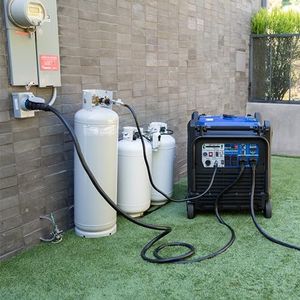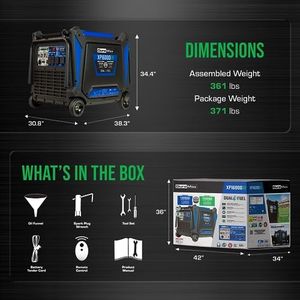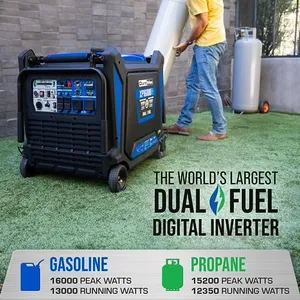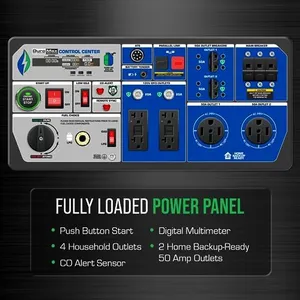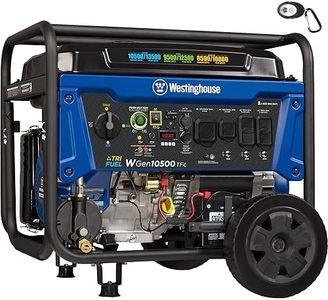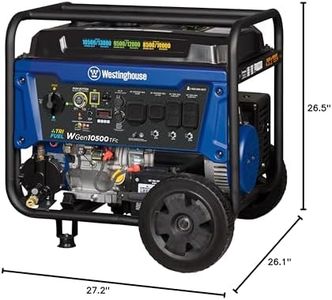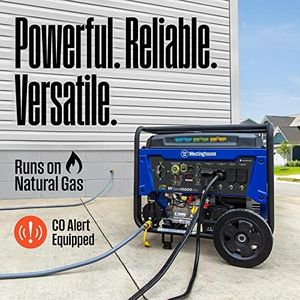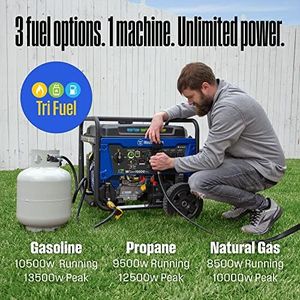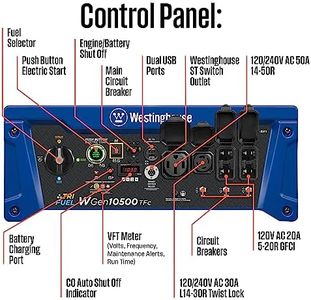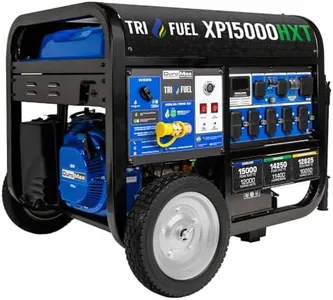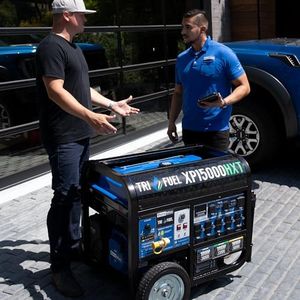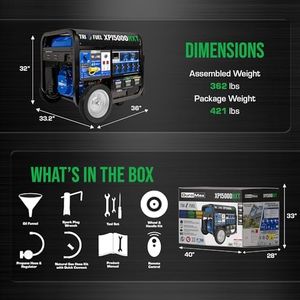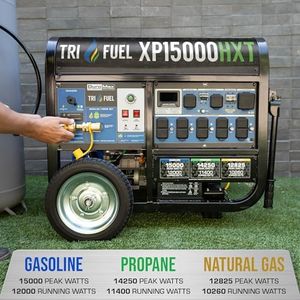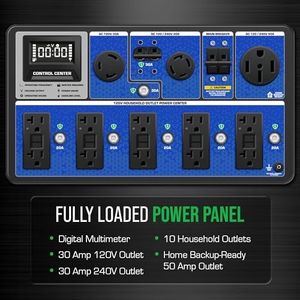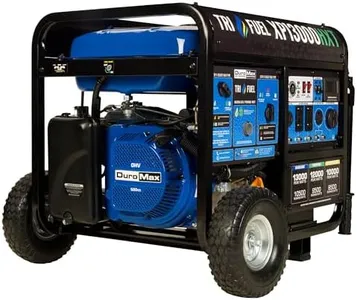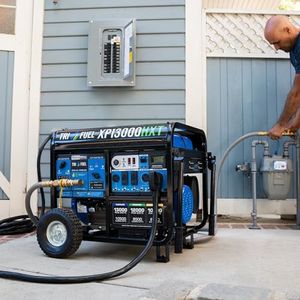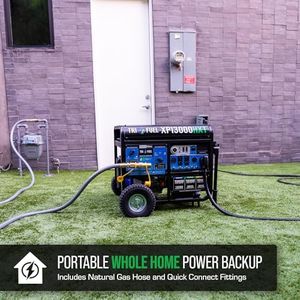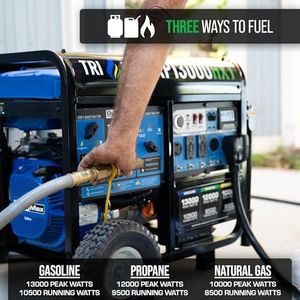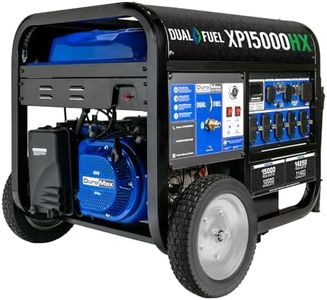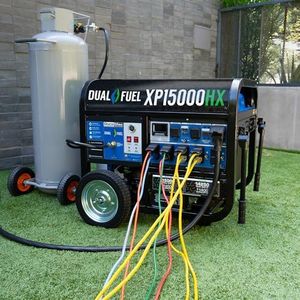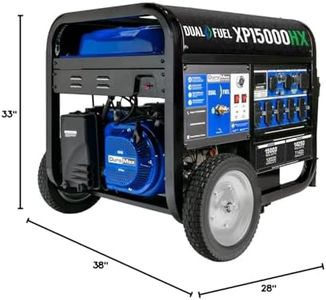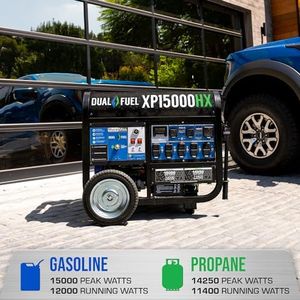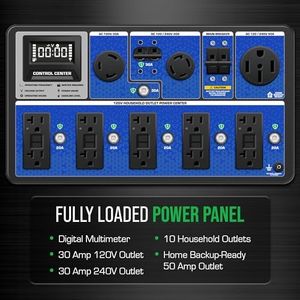10 Best Home Generators 2025 in the United States
Winner
Generac Guardian 24kW Home Standby Generator with 200 Amp Transfer Switch - Automatic Whole House Backup Power for Storms, Emergencies, and Outages, WiFi Enabled, Runs on Natural Gas or Liquid Propane
The Generac Guardian 24kW Home Standby Generator is designed to provide strong and reliable backup power for your entire home, especially useful during storms or power outages. It offers a powerful 24,000-watt output, which is enough to keep most household appliances and systems running smoothly. The generator runs on either natural gas or liquid propane, giving you flexible fuel options that can be convenient depending on your home's setup. One of its great features is the automatic start — it turns on by itself when the power goes out, so you don’t have to worry about starting it manually. It also includes a 200-amp transfer switch, allowing easy and safe switching between utility power and generator power.
Most important from
426 reviews
Jackery HomePower 3000 Portable Power Station with 2x 200W Solar Panels, 3600W (Surge 7200W) Output, 3072Wh LFP Battery Solar Generator, Essential Backup for Home Use, Power Outage, RV, Emergencies
The Jackery HomePower 3000 is a strong choice for home backup power, offering a solid 3600 watts of running power and a surge capacity of 7200 watts to handle essential appliances like refrigerators, fans, and lights during outages. Its large 3072Wh battery can keep a fridge running for 1-2 days and power a household for up to 15 hours. It runs on electricity stored in its battery, so no gas or fuel is needed, making it cleaner and quieter than traditional fuel generators.
Most important from
393 reviews
Generac Guardian 26kW Home Standby Generator with 200 Amp Transfer Switch - Automatic Whole House Backup Power for Storms, Emergencies, and Outages, WiFi Enabled, Runs on Natural Gas or Liquid Propane
The Generac Guardian 26kW Home Standby Generator is a solid choice for homeowners looking for reliable whole-house backup power. Its 26,000-watt output is strong enough to keep most household appliances and systems running smoothly during an outage. It runs on natural gas or propane, which are common and convenient fuel options for home standby generators. The generator features an automatic electronic start, meaning it turns on by itself when power goes out, so you don't have to worry about manual operation.
Most important from
426 reviews
Top 10 Best Home Generators 2025 in the United States
Winner
Generac Guardian 24kW Home Standby Generator with 200 Amp Transfer Switch - Automatic Whole House Backup Power for Storms, Emergencies, and Outages, WiFi Enabled, Runs on Natural Gas or Liquid Propane
Generac Guardian 24kW Home Standby Generator with 200 Amp Transfer Switch - Automatic Whole House Backup Power for Storms, Emergencies, and Outages, WiFi Enabled, Runs on Natural Gas or Liquid Propane
Chosen by 1397 this week
Jackery HomePower 3000 Portable Power Station with 2x 200W Solar Panels, 3600W (Surge 7200W) Output, 3072Wh LFP Battery Solar Generator, Essential Backup for Home Use, Power Outage, RV, Emergencies
Jackery HomePower 3000 Portable Power Station with 2x 200W Solar Panels, 3600W (Surge 7200W) Output, 3072Wh LFP Battery Solar Generator, Essential Backup for Home Use, Power Outage, RV, Emergencies
Generac Guardian 26kW Home Standby Generator with 200 Amp Transfer Switch - Automatic Whole House Backup Power for Storms, Emergencies, and Outages, WiFi Enabled, Runs on Natural Gas or Liquid Propane
Generac Guardian 26kW Home Standby Generator with 200 Amp Transfer Switch - Automatic Whole House Backup Power for Storms, Emergencies, and Outages, WiFi Enabled, Runs on Natural Gas or Liquid Propane
Generac Guardian 10kW Home Standby Generator with 100 Amp Transfer Switch - Automatic Whole House Backup Power for Storms, Emergencies, and Outages, WiFi Enabled, Runs on Natural Gas or Liquid Propane
Generac Guardian 10kW Home Standby Generator with 100 Amp Transfer Switch - Automatic Whole House Backup Power for Storms, Emergencies, and Outages, WiFi Enabled, Runs on Natural Gas or Liquid Propane
Generac Guardian 22kW Home Standby Generator with 200 Amp Transfer Switch - Automatic Whole House Backup Power for Storms, Emergencies, and Outages, WiFi Enabled, Runs on Natural Gas or Liquid Propane
Generac Guardian 22kW Home Standby Generator with 200 Amp Transfer Switch - Automatic Whole House Backup Power for Storms, Emergencies, and Outages, WiFi Enabled, Runs on Natural Gas or Liquid Propane
DuroMax XP16000iH 16,000-Watt Dual Fuel Portable Digital Inverter Generator - Gas & Propane, Remote Electric Start, Whole Home Power Backup, Transfer Switch Ready, RV & Emergency Ready
DuroMax XP16000iH 16,000-Watt Dual Fuel Portable Digital Inverter Generator - Gas & Propane, Remote Electric Start, Whole Home Power Backup, Transfer Switch Ready, RV & Emergency Ready
Westinghouse 13500 Peak Watt Tri-Fuel Home Backup Portable Generator, Remote Electric Start, Transfer Switch Ready, Gas, Propane, and Natural Gas Powered
Westinghouse 13500 Peak Watt Tri-Fuel Home Backup Portable Generator, Remote Electric Start, Transfer Switch Ready, Gas, Propane, and Natural Gas Powered
DuroMax XP15000HXT 15,000 Watt Tri Fuel Portable Home Power Backup HXT Generator w/CO Alert
DuroMax XP15000HXT 15,000 Watt Tri Fuel Portable Home Power Backup HXT Generator w/CO Alert
DuroMax XP13000HXT 13,000-Watt 500cc Tri Fuel Gas Propane Natural Gas Portable Generator with CO Alert, Black/Blue
DuroMax XP13000HXT 13,000-Watt 500cc Tri Fuel Gas Propane Natural Gas Portable Generator with CO Alert, Black/Blue
DuroMax XP15000HX 15,000-Watt Dual Fuel Portable Generator - Gas & Propane, Remote Electric Start, Whole Home Power Backup, Transfer Switch Ready, RV & Emergency Ready
DuroMax XP15000HX 15,000-Watt Dual Fuel Portable Generator - Gas & Propane, Remote Electric Start, Whole Home Power Backup, Transfer Switch Ready, RV & Emergency Ready
Our technology thoroughly searches through the online shopping world, reviewing hundreds of sites. We then process and analyze this information, updating in real-time to bring you the latest top-rated products. This way, you always get the best and most current options available.

